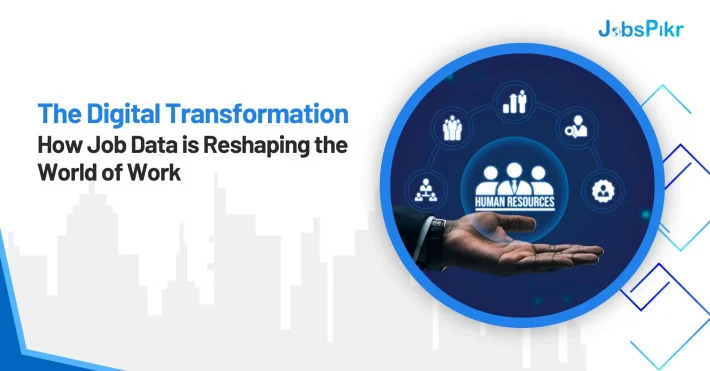- The Importance of Job Data
- Understanding Digital Transformation
- Identifying Key Challenges
-
Leveraging Job Data for Strategic Decision Making
- Improving Recruitment and Talent Acquisition
- Improving Employee Performance and Productivity
- Optimizing Workforce Planning and Resource Allocation
- Driving Organizational Development and Succession Planning
- Empowering Successful Learning and Development Initiatives
- Promoting Diversity and Inclusion in the Workplace
- Mitigating Bias and Ensuring Fairness in Hiring and Promotions
- Conclusion
The way businesses operate has been transformed by digital advancement, touching every corner of the working world. Job data, a valuable resource for organizations, holds a wealth of insights and opportunities for making strategic decisions. By tapping into the potential of job data, organizations can enhance their recruitment procedures, boost employee performance, stimulate organizational growth, and champion diversity and inclusivity in the workplace. In this article, we will delve into the significance of job data, grasp the essence of digital transformation, pinpoint notable challenges, and explore how organizations can utilize job data to revolutionize their operations.
The Importance of Job Data
Job data encompasses details regarding positions, skills, qualifications, and performance metrics within an organization. It offers a holistic perspective of the workforce and empowers organizations to make well-informed choices about talent acquisition, workforce planning, and employee development. Additionally, job data equips organizations to detect patterns, trends, and disparities, facilitating the alignment of their strategies with their business objectives and goals.
Understanding Digital Transformation
Source: Convergehub
Digital transformation is all about embracing digital technologies and seamlessly weaving them into every facet of an organization’s operations, processes, and culture. It marks a departure from conventional manual or paper-based systems towards digital platforms, resulting in more streamlined operations, heightened efficiency, and a newfound competitive advantage. In the world of work, digital transformation has grown increasingly vital as organizations strive to excel in an ever-changing global marketplace.
Identifying Key Challenges
While digital transformation offers immense potential, organizations must overcome certain challenges to unlock the power of job data effectively. Some key challenges include:
- Data Accessibility: Ensuring that job data is easily accessible to relevant stakeholders within the organization.
- Data Quality: Ensuring the accuracy, consistency, and relevance of job data to make informed decisions.
- Data Privacy and Security: Safeguarding confidential job data and adhering to privacy regulations to protect employee information.
- Change Management: Navigating resistance to change and fostering a culture that embraces digital transformation.
- Data Analysis and Interpretation: Building capabilities to effectively analyze and interpret job data to drive strategic decision-making.
Addressing these challenges is crucial for organizations to fully leverage the power of job data in their digital transformation journey.
Leveraging Job Data for Strategic Decision Making
In the ever-evolving business landscape, the ability to make effective strategic decisions is paramount for organizations. Job data serves as a valuable tool, equipping decision-makers to shape workforce strategies, optimize their recruitment processes, and steer their organization toward success. Here are some crucial areas where organizations can utilize job data to inform their strategic decision-making:
Improving Recruitment and Talent Acquisition
Recruitment plays a pivotal role in an organization’s triumph. By making use of job data, organizations can pinpoint the skills, qualifications, and experience necessary for specific roles. This empowers recruiters to create precise job descriptions, target the right talent pools, and make decisions rooted in data. Furthermore, job data aids organizations in identifying potential skill gaps and devising strategies to attract and retain top talent.
Improving Employee Performance and Productivity
Job data offers valuable insights into employee performance, enabling organizations to pinpoint areas that need improvement, provide tailored training and development opportunities, and elevate overall productivity. Through the analysis of job data, organizations can identify top-performing employees and model their success by implementing training programs and initiatives aimed at engaging and motivating their workforce.
Optimizing Workforce Planning and Resource Allocation
Workforce planning involves forecasting future talent needs and aligning resources accordingly. By analyzing job data, organizations can identify areas of skill shortages or surplus, enabling them to develop effective workforce planning strategies. Additionally, job data helps organizations identify high-potential employees who can be groomed for future leadership roles.
Driving Organizational Development and Succession Planning
Job data enables organizations to identify key areas for organizational development and succession planning. By analyzing the skills and qualifications of employees, organizations can create development programs that align with business goals and prepare a pipeline of talent for critical leadership positions.
Empowering Successful Learning and Development Initiatives
Job data assumes a critical role in the identification of skill gaps within an organization, allowing HR departments to customize learning and development programs for addressing these deficiencies. By fully leveraging job data, organizations can identify the precise skills essential for future success and ensure that employees receive the necessary training and development opportunities to remain competitive and proficient in their roles.
Promoting Diversity and Inclusion in the Workplace
Diversity and inclusion are crucial for fostering a vibrant and innovative work environment. Job data can help organizations identify diversity gaps and develop strategies to promote inclusivity. By analyzing job data, organizations can ensure fair representation across gender, ethnicity, and other dimensions of diversity.
Mitigating Bias and Ensuring Fairness in Hiring and Promotions
Job data can significantly contribute to reducing bias in hiring and promotion processes. By analyzing job data, organizations can identify potential biases and implement measures to ensure fairness and equal opportunities for all employees.
Conclusion
In the world of work, digital transformation has emerged as a significant catalyst, equipping organizations with the means to unlock the remarkable potential inherent in job data for intelligent decision-making. When organizations adeptly harness job data, they have the capacity to streamline their recruitment procedures, elevate the performance of their workforce, refine their workforce planning, fuel the expansion of their organization, and champion the cause of diversity and inclusion. To truly embrace the benefits of digital transformation, organizations need to tackle some important challenges, including making job data accessible, ensuring its quality, safeguarding privacy and security, and managing change effectively. By overcoming these hurdles, they can fully unlock the power of job data and chart a path to long-term success in our ever-evolving work environment.




